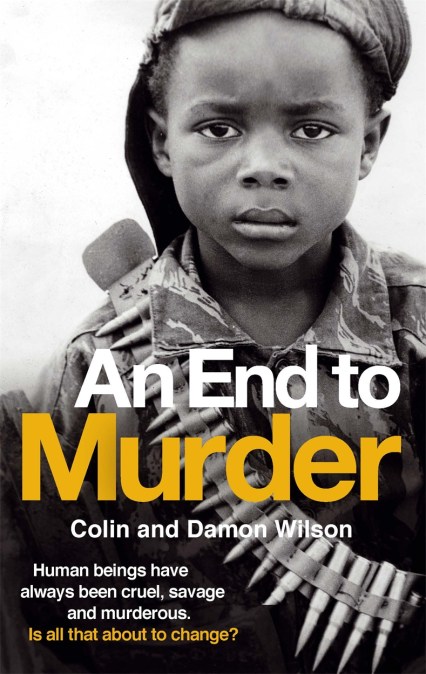Creatively and intellectually there is no other species that has ever come close to equalling humanity’s achievements, but nor is any other species as suicidally prone to internecine conflict. We are the only species on the planet whose ingrained habit of conflict constitutes the chief threat to our own survival. Human history can be seen as a catalogue of cold-hearted murders, mindless blood-feuds, appalling massacres and devastating wars, but, with developments in forensic science and modern psychology, and with raised education levels throughout the world, might it soon be possible to reign in humanity’s homicidal habits? Falling violent crime statistics in every part of the world seem to indicate that something along those lines might indeed be happening.
Colin and Damon Wilson, who between them have been covering the field of criminology for over fifty years, offer an analysis of the overall spectrum of human violence. They consider whether human beings are in reality as cruel and violent as is generally believed and they explore the possibility that humankind is on the verge of a fundamental change: that we are about to become truly civilised.
As well as offering an overview of violence throughout our history – from the first hominids to the twenty-first century, touching on key moments of change and also indicating where things have not changed since the Stone Age – they explore the latest psychological, forensic and social attempts to understand and curb modern human violence.
To begin with, they examine questions such as: Were the first humans cannibalistic? Did the birth of civilisation also lead to the invention of war and slavery? Priests and kings brought social stability, but were they also the instigators of the first mass murders? Is it in fact wealth that is the ultimate weapon?
They look at slavery and ancient Roman sadism, but also the possibility that our own distaste for pain and cruelty is no more than a social construct. They show how the humanitarian ideas of the great religious innovators all too quickly became distorted by organised religious structures.
The book ranges widely, from fifteenth-century Baron Gilles de Rais, ‘Bluebeard’, the first known and possibly most prolific serial killer in history, to Victorian domestic murder and the invention of psychiatry and Sherlock Holmes and the invention of forensic science; from the fifteenth-century Taiping Rebellion in China, in which up to 36 million died to the First and Second World Wars and more recent genocides and instances of ‘ethnic cleansing’, and contemporary terrorism. They conclude by assessing the very real possibility that the internet and the greater freedom of information it has brought is leading, gradually, to a profoundly more civilised world than at any time in the past.
Colin and Damon Wilson, who between them have been covering the field of criminology for over fifty years, offer an analysis of the overall spectrum of human violence. They consider whether human beings are in reality as cruel and violent as is generally believed and they explore the possibility that humankind is on the verge of a fundamental change: that we are about to become truly civilised.
As well as offering an overview of violence throughout our history – from the first hominids to the twenty-first century, touching on key moments of change and also indicating where things have not changed since the Stone Age – they explore the latest psychological, forensic and social attempts to understand and curb modern human violence.
To begin with, they examine questions such as: Were the first humans cannibalistic? Did the birth of civilisation also lead to the invention of war and slavery? Priests and kings brought social stability, but were they also the instigators of the first mass murders? Is it in fact wealth that is the ultimate weapon?
They look at slavery and ancient Roman sadism, but also the possibility that our own distaste for pain and cruelty is no more than a social construct. They show how the humanitarian ideas of the great religious innovators all too quickly became distorted by organised religious structures.
The book ranges widely, from fifteenth-century Baron Gilles de Rais, ‘Bluebeard’, the first known and possibly most prolific serial killer in history, to Victorian domestic murder and the invention of psychiatry and Sherlock Holmes and the invention of forensic science; from the fifteenth-century Taiping Rebellion in China, in which up to 36 million died to the First and Second World Wars and more recent genocides and instances of ‘ethnic cleansing’, and contemporary terrorism. They conclude by assessing the very real possibility that the internet and the greater freedom of information it has brought is leading, gradually, to a profoundly more civilised world than at any time in the past.
Newsletter Signup
By clicking ‘Sign Up,’ I acknowledge that I have read and agree to Hachette Book Group’s Privacy Policy and Terms of Use

